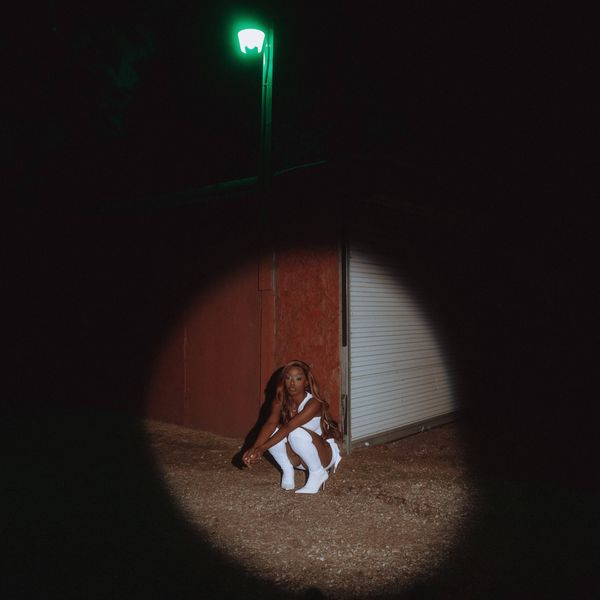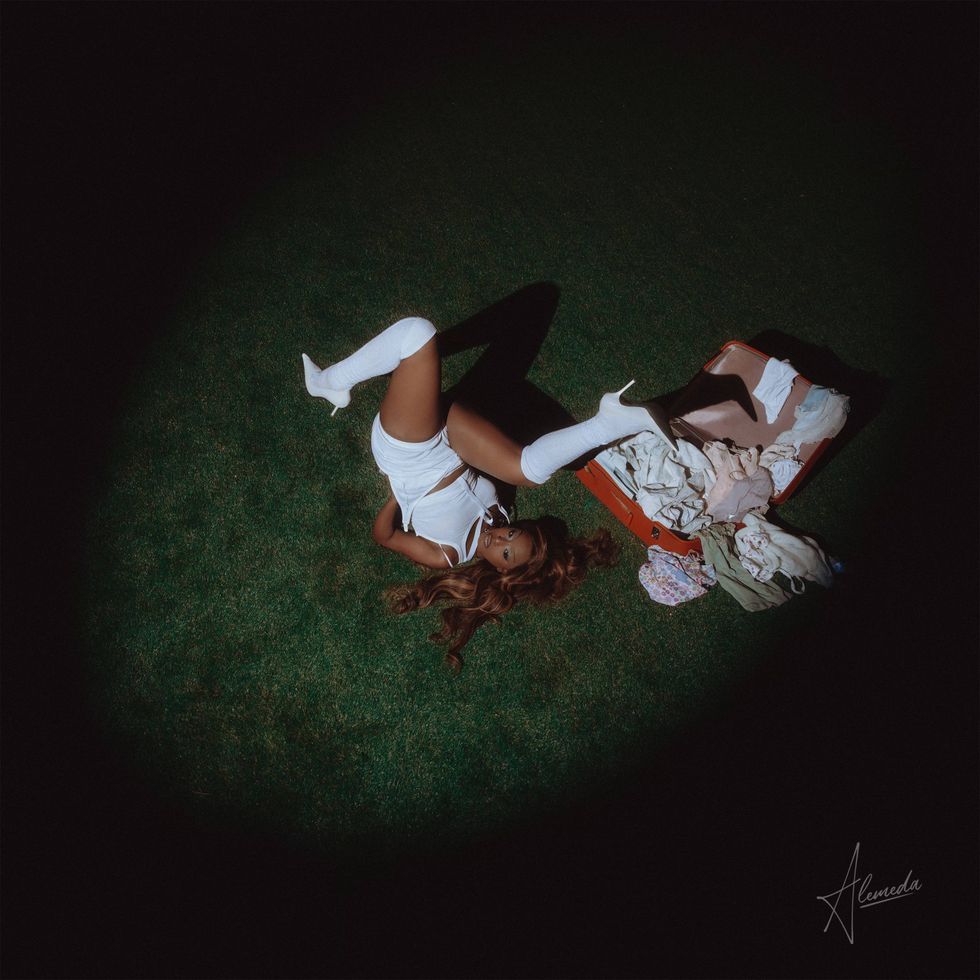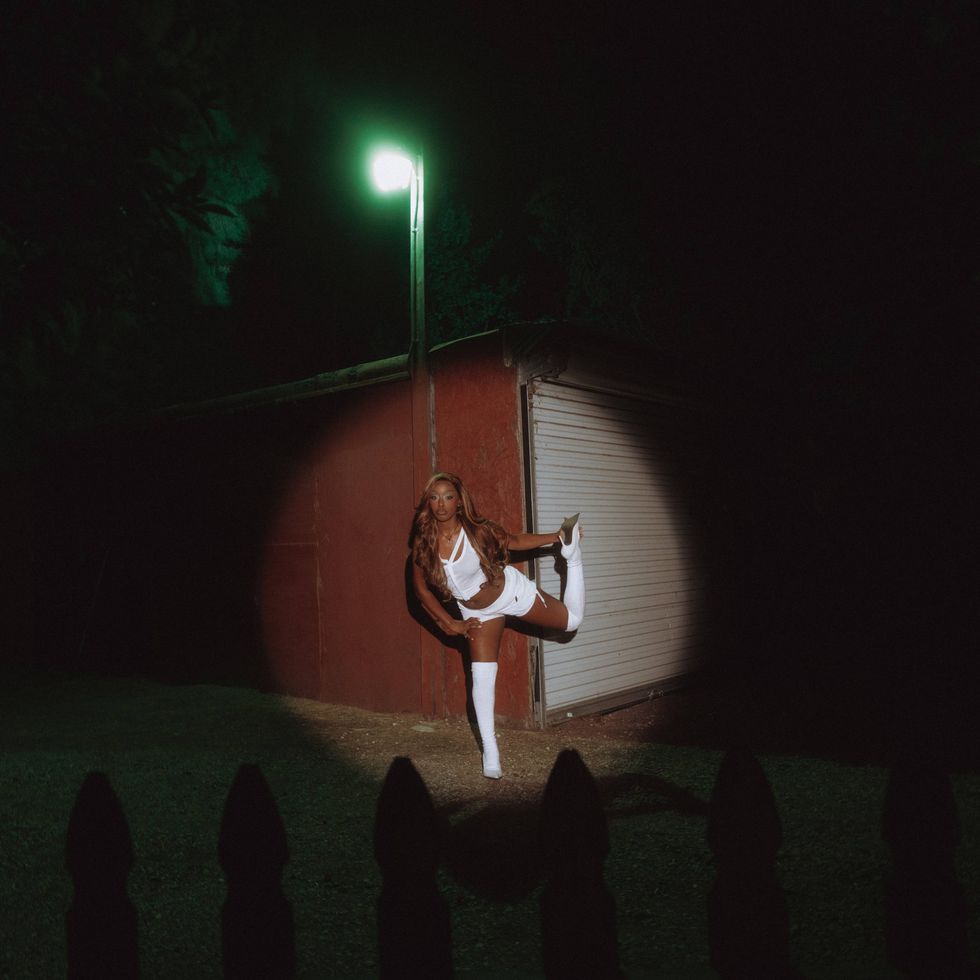
The Spotlight Found Alemeda
By Tobias Hess
Nov 06, 2025“If [music] doesn't, I’ll work at a cat sanctuary,” singer Alemeda tells me over Zoom from a sunny Los Angeles living room.
The LA-based, Arizona/Ethiopia-raised TDE signee self describes as “nonchalant,” a mode which has both served her career and presented challenges to her growth in this infinitely demanding industry.
Being signed to the label that birthed the careers of Kendrick Lamar, SZA, Doechii and others is a lot for an artist who just started posting covers and drumless loosies on Soundcloud. But when opportunity came knocking in the form of a reach out from TDE’s co-president, Moosa, she had to lean into this scary, rare and exhilarating path.
“I just never envisioned this opportunity being given to me,” she says. “But I see that I'm here and I'm probably going to have that feeling forever.”
There were moments, though, when the demands of being a road to stardom were simply too strenuous. Thankfully, label mate Doechii — who she collaborated with on recent single, “Beat a B!tch Up” — provided some needed motivation during a particular low point.
“I was telling my manager, ‘I don't think I'm meant for this.’ This industry brings out a lot of shit in you. And with my childhood, I didn’t think I could heal from what I went through and deal with what I was going through [with the industry],” Alemeda recalls. “I met Deochii and I was complaining about something and she's like, ‘Well, do you want this or not?’ I was like, ‘Damn, that's, that's the attitude I need to have about this.’”
The result of that renewed determination is Alemeda’s EP (out tomorrow on TDE/Warner Records), But What The Hell Do I Know, a distillation of her sound: guitar driven, lyrically unvarnished and ragefully anthemic (just try EP single, “1-800-F**K-YOU.”)
“I want it to be authentic. I actually went through shit,” she shares. Music may have not been the preordained path for Alemeda, but now she’s here, she’s going to make sure it’s raw, unfiltered and 100% Alemeda.
PAPER chatted with the busy artist about her unique road to music, navigating this difficult industry and getting vocal lessons from the legendary Willie Norwood.

EP art, What The Hell Do I Know
We have someone random but important in common. I've been internet friends with [music manager/A&R] Jacob Blieu for years.
That's my OG. He actually discovered me basically. He was one of the first people ever to reach out to me. I didn't even know there was an Arizona music scene. He just knew people that kept him in the loop. He was trying to reach out to me to manage me, and I was ignoring the fuck out of him. I was like, “Bro, who are you? Leave me alone.” I was really introverted, so I was kind of scared. But he was really just trying to help me.
You had music on SoundCloud at that point?
I had music on SoundCloud. I was doing a lot of covers. I had just dropped my first song when he hit me up.
What was your music back then like?
I didn't have anything. I didn't have producers. I was working with YouTube beats, just loops. I didn't know what I was doing. I don't know if I could describe what I was doing because I don't even know what I was doing. I was just trying out whatever. No specific genre.
Was there any thread of this emo, 2000s rock that is your lane now?
Kind of, minus the drums. I know how to produce now, but at the time I was strictly using guitar loops.
How did you get to LA and the music industry from Phoenix?
I was in Arizona. I was posting covers. I’m Ethiopian. There's a thing with Ethiopians. It's like some telepathic shit; we all just know each other. You would think we're all cousins. We call each other cousins. We even called The Weeknd a cousin. He doesn't know nothing about us. Jacob knew me and this Ethiopian [member of Jacob’s team, Nas] would post me, my covers and songs. I had a big following from the East African community. I literally had 1000 followers on Instagram, but I was getting so much engagement. Everybody thought I was faking it, like I had fake people commenting. It was that crazy. Moussa and my now manager reached out to me because he was following [Nas] and he eventually followed me. He reached out to me and asked, “Are you being managed?” I literally called Jacob, because I didn't know anything about the music industry. I was like, “Do you know this guy? His name is Moosa Tadé?” It was Moosa TDE, but I didn't know what TDE was.
I was at work and [Jacob] was like, “Bro, once you get out of work … just pull up to the house.” I started getting anxiety. He started breaking down TDE to me. I knew the artists [on TDE], but I didn't know anything about the label world. No one around me really listened to hip hop growing up, but Jacob broke it down. He might as well have had a whiteboard. This is Kendrick. They started this whole thing. They had the Black Hippie. I was like, “Okay, interesting.” I was trying to run away anyway, so basically he helped me talk to Moosa. [Jacob] came with me to LA and then I got signed.
When you get to LA to meet with TDE, it's like winning the lottery. Were you trying to play it cool?
I was so nonchalant. [Jacob] was more hype than I, because he understood the gravity of it. I was like, Bro, I'm not even trying to be an artist for real. I don't wanna be famous for real. We had this joke where I was like, “If I'm famous, I just want to be famous in the UK and that's it.” I thought they had better music taste. [Jacob] was like, “Bro, you can't close your mind to just that. You have to be all in or nothing.” I was like, Let me just do it. To this day, I'm very nonchalant about a lot of shit. I’ll be having impostor syndrome and all that.
Once you got started on that track, was there any element of you like, “Oh fuck, what did I sign up for?”
Yeah, to this day. I never envisioned this opportunity being given to me. But I see that I'm here and I'm probably going to have that feeling forever.
Every day you're actively choosing to do it, you're opting in. What was the biggest learning curve once you started this?
How much you have to prove yourself, no matter what point you're at. I thought like, “Okay, if I get to this point, I'm not going to have to do as much now.” I’m at the point I'm at now, but I'm still having to prove myself and keep the exact level of effort. Like you said, you're choosing every day to contribute to this dream.
Are you a competitive person?
Oh my God, no. I don't know how to explain it: I care, but I don't care at the same time. If it happens, it happens. If it doesn't, I’ll work at a cat sanctuary.

You came on board to TDE pretty far before Doechii had her super-mainstream blow up. Did seeing that up close teach you anything that you take with you?
She inspired me even before this happened, just being the type of person she is. She's so confident. I had some serious impostor syndrome to the point where I actually was going to leave. I was telling my manager, “I don't think I'm meant for this.” This industry brings out a lot of shit in you. And with my childhood, I didn’t think I could heal from what I went through and deal with what I was going through [with the industry]. It was mentally fucking me. I met her and I was complaining about something and she's like, “Well, do you want this or not?” I was like, Damn, that's, that's the attitude I need to have about this. She's just so confident. It literally rubbed off on me instantly the moment she came around. What happened in the past couple years with her has inspired me to visualize that it could happen for me, because she's so close to me.
How has the process of crafting a record been for you?
My biggest thing is if I am going to do music, I want it to be authentic. I actually went through shit. I've always been anti-[song]writer, but I have learned to work with a lot of musicians, people who play instruments for real, because the type of music I make, I don't want it to sound like some bullshit ass production. I want it to sound like a real jam session. In the very beginning, I had a rule that no one's allowed in the studio except for me because it’s too many chefs. People give so many opinions and I'm trying to get my shit together and I'm still trying to figure out my sound. Now I'm more open, but I still like to keep it under 3 people.
I know Brandy's dad, Willie Norwood, gave you vocal training. How was that experience?
He low key changed my life. I was singing incorrectly my whole life, and I kind of fucked up my vocals in general, even when I talk. He taught me how to sing from my diaphragm. I never understood what that meant. He taught me like within the first lesson and I was like, Oh shit, this is, this is probably why Brandy is who she is, which is fucking talented.
What was in your mind as you were crafting this project? Did you have an intention of what this was gonna be for you?
I wanted it to be more vulnerable, authentic and true to the growth I've had in the last couple with my maturity. And then nostalgia, not necessarily recreating, but drawing from songs I loved as a kid. For every song I have, I could tell you exactly what song it was inspired by.
Photo credit: Abdi Ibrahim
From Your Site Articles
- Alemeda and Doechii Are Ready To 'Beat a B!tch Up' ›
- Alt-Pop Breakout Alemeda Shines in Brooklyn ›
- Lollapalooza 2025: PAPER's Version ›
- Jae Stephens, the Internet's 'Black Pop Star,' Has Always Been Here ›
Related Articles Around the Web
MORE ON PAPER
ATF Story
Madison Beer, Her Way
Photography by Davis Bates / Story by Alaska Riley
Photography by Davis Bates / Story by Alaska Riley
16 January
Entertainment
Cynthia Erivo in Full Bloom
Photography by David LaChapelle / Story by Joan Summers / Styling by Jason Bolden / Makeup by Joanna Simkim / Nails by Shea Osei
Photography by David LaChapelle / Story by Joan Summers / Styling by Jason Bolden / Makeup by Joanna Simkim / Nails by Shea Osei
01 December
Entertainment
Rami Malek Is Certifiably Unserious
Story by Joan Summers / Photography by Adam Powell
Story by Joan Summers / Photography by Adam Powell
14 November
Music
Janelle Monáe, HalloQueen
Story by Ivan Guzman / Photography by Pol Kurucz/ Styling by Alexandra Mandelkorn/ Hair by Nikki Nelms/ Makeup by Sasha Glasser/ Nails by Juan Alvear/ Set design by Krystall Schott
Story by Ivan Guzman / Photography by Pol Kurucz/ Styling by Alexandra Mandelkorn/ Hair by Nikki Nelms/ Makeup by Sasha Glasser/ Nails by Juan Alvear/ Set design by Krystall Schott
27 October
Music
You Don’t Move Cardi B
Story by Erica Campbell / Photography by Jora Frantzis / Styling by Kollin Carter/ Hair by Tokyo Stylez/ Makeup by Erika LaPearl/ Nails by Coca Nguyen/ Set design by Allegra Peyton
Story by Erica Campbell / Photography by Jora Frantzis / Styling by Kollin Carter/ Hair by Tokyo Stylez/ Makeup by Erika LaPearl/ Nails by Coca Nguyen/ Set design by Allegra Peyton
14 October




